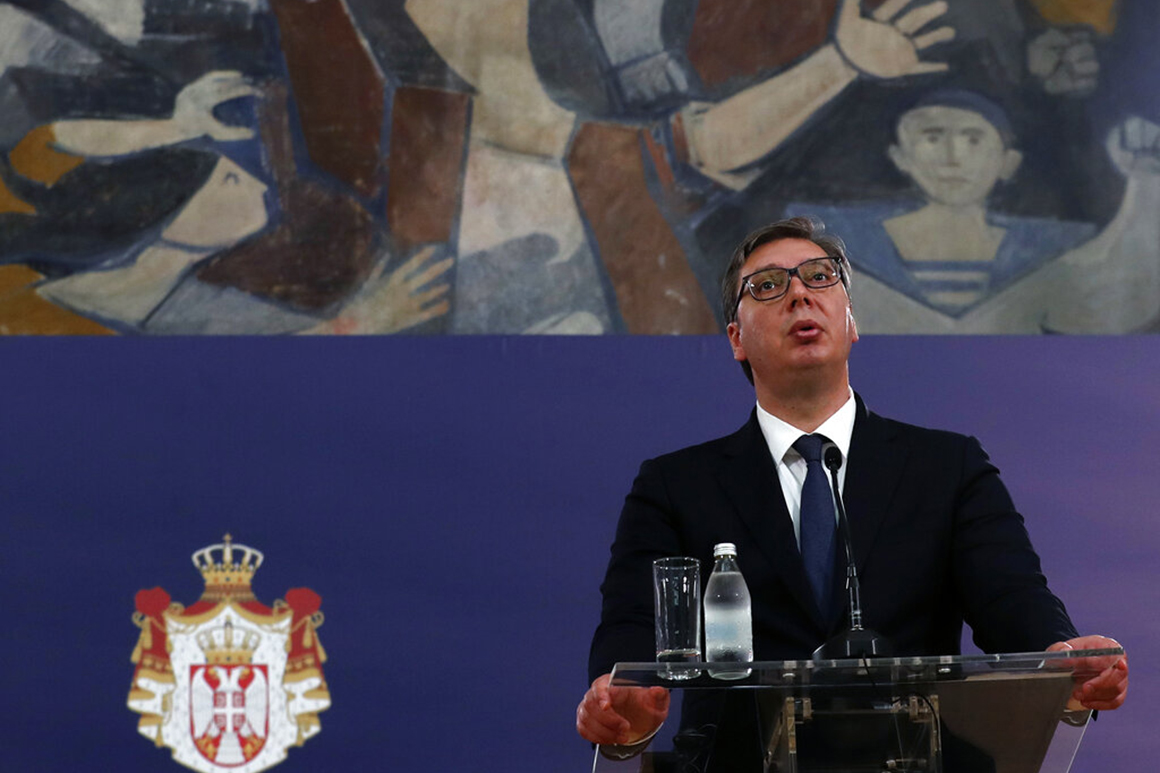
Vučić has also courted controversy during the coronavirus crisis. Early in the pandemic, he blasted the European Union for initially restricting the export of medical equipment to countries on its periphery, claiming in a press conference that “EU solidarity is a fairy tale that does not exist” while heaping praise on China.
But such criticism has not dented Vučić’s standing at home or abroad. In a clear intervention in the election campaign, Donald Tusk, the president of the European People’s Party — the Continent’s main center-right political family — tweeted praise for Vučić after a video call this week.
„Dear President, you have full right to be proud and satisfied with what you have done for Serbia during your term. Economic success and strong leadership constitute the trademark of your rule,“ Tusk gushed. „Good luck on Sunday.“
Vujo Ilić, a political scientist at the Center for Research, Transparency and Accountability, an NGO, said such remarks helped Vučić with a „balancing act“ in which he tries to stay on good terms with disparate international powers, including the EU, traditional ally Russia and China.
“There is no mention of democracy or the transparency of elections in that tweet,“ noted Ilić.
Vučić himself has presented the election as being about the need for strong leadership. „Serbia finds itself at a time where it needs to be concerned about important issues and where great political challenges await us. For that we need a strong government and a strong parliament,“ he told public broadcaster RTS.
Vučić’s next international challenge is next Saturday’s visit to the White House (just a few days after a trip to Moscow) for the first talks to be hosted there between leaders of Serbia and Kosovo.
The two states have been locked in a frozen conflict since 1999, when NATO bombing ended Serbian control of Kosovo in the last of the wars that tore Yugoslavia apart. Kosovo declared independence from Serbia in 2008 but Belgrade continues to regard the territory as a rebel province, blocking its path to international organizations with the support of Moscow and Beijing.
For years, the EU has tried to foster dialogue and closer cooperation between the two sides. But the United States has seized the initiative in recent months, led by Richard Grenell, the former U.S. ambassador to Germany who was last year appointed President Donald Trump’s special envoy for the talks.
Grenell said this week the White House discussions would focus on economic issues. „We, the United States, feel very strongly that this 20-year fight between Kosovo and Serbia is only going to be solved through economic normalization, jobs for young people, and a growing economy,“ Grenell told Kosovan media outlet Gazeta Express.
While the outcome of the White House talks is unclear, the result of Sunday’s election is anything but — in part because of deep divides in the opposition ranks.
For the past year and a half, opposition parties and their supporters held near-weekly protests in several cities in a development considered the most significant political upheaval since the ouster of strongman Slobodan Milošević in 2000.
Sparked by a physical attack on opposition politician Borko Stefanović, the protests called for electoral reform and increased media freedom, among other changes, and their leaders threatened to boycott the elections if their demands were not met.
This culminated in talks between several Serbian political parties, mediated by the European Parliament, with progress made in the area of electoral reform and misuse of public resources. Most notably, the electoral threshold was lowered from 5 percent to 3 percent of the vote, making it easier for some of the newer protest parties to enter parliament.
But some saw these reforms as insufficient, and the opposition bloc has since split. The Union for Serbia coalition led by former Belgrade mayor Dragan Đilas is boycotting the poll and urging voters to do the same. But others, like the Movement of Free Citizens of actor-turned-politician Sergej Trifunović, have chosen to participate.
“The Serbian Progressive Party will have a majority with or without the boycott,” said analyst Sonja Stojanović Gajić. “This will allow President Vučić to claim internationally that he is the voice of the people, even if a significant part of the electorate decided to boycott voting.”
Stojanović Gajić also noted that the ongoing pandemic means monitoring of the election will be significantly scaled down, increasing the risk of fraud and other irregularities.
„The international monitors won’t be there in sufficient numbers and domestic monitors have decided to monitor the elections from outside the polling stations because of the safety of their staff,” she said.
Source: politico.com
See more here: news365.stream






